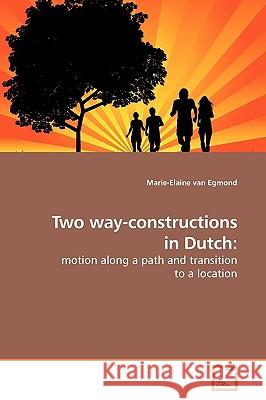Two way-constructions in Dutch » książka
Two way-constructions in Dutch
ISBN-13: 9783639162677 / Angielski / Miękka / 2009 / 202 str.
This book introduces a Dutch construction, called the Transition to Location Construction (TLC) (e.g. Hugo zong zich in de finale 'Hugo sang his way into the final'). A second Dutch way-construction, called the weg-construction (e.g. Hugo schopte zich een weg door de menigte 'Hugo kicked his way through the crowd'), is also investigated. Both constructions are parallel to the English way-construction, but in Dutch they have a different meaning and syntax: the weg-construction is ditransitive and denotes motion along a path, whereas the TLC is transitive and denotes a transition to a location, which does not involve the traversal of a path. The constructions are of interest, because they represent a mismatch in the syntax-semantics mapping: the verb has syntactic complements, but these are not semantic arguments of the verb. Both constructions are very productive and should therefore be taken seriously by any theory of syntax. A Minimalist account is offered here, but this is not without problems, as this theory is currently unable to account for the fact that it is not the verb that determines the complement configuration of the clause, but the construction itself.
This book introduces a Dutch construction, called the Transition to Location Construction (TLC) (e.g. Hugo zong zich in de finale Hugo sang his way into the final). A second Dutch way-construction, called the weg-construction (e.g. Hugo schopte zich een weg door de menigte Hugo kicked his way through the crowd), is also investigated. Both constructions are parallel to the English way-construction, but in Dutch they have a different meaning and syntax: the weg-construction is ditransitive and denotes motion along a path, whereas the TLC is transitive and denotes a transition to a location, which does not involve the traversal of a path. The constructions are of interest, because they represent a mismatch in the syntax-semantics mapping: the verb has syntactic complements, but these are not semantic arguments of the verb. Both constructions are very productive and should therefore be taken seriously by any theory of syntax. A Minimalist account is offered here, but this is not without problems, as this theory is currently unable to account for the fact that it is not the verb that determines the complement configuration of the clause, but the construction itself.











